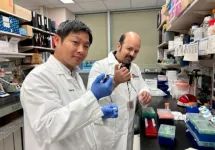(Press-News.org) **ECCMID has now changed its name to ESCMID Global, please credit ESCMID Global Congress (formerly ECCMID, Barcelona, Spain, 27-30 April) in all future stories**
In global crises like the COVID-19 pandemic, it is vital that scientists step forward to engage with the public and help deliver medical and scientific advice in a friendly, digestible and open format. While the traditional way for scientists to do this is by responding to media requests, alternatives, including collaborating with illustrators and local communities, will be discussed in a new evidence review given at this year’s ESCMID Global Congress (formerly ECCMID) by Associate Professor Siouxsie Wiles of the Bioluminescent Superbugs Lab, University of Auckland, New Zealand.
In the talk, microbiologist Dr Wiles will discuss her collaboration with cartoonist Toby Morris, to present information about COVID-19 in a digestible, easy-to-read ‘bitesize’ and sharable format. The first graphic they produced together, called ‘Flatten the curve’, showed with a simple graph that by adopting measures to prevent the spread of COVID-19, countries could reduce the rate at which their populations became infected, and thus reduce the flow of people into hospital and ultimately in intensive care units. Their graphic was an instant hit on social media and was shared millions of times online.
Also used in mass population communications was another graphic by Wiles and Morris, essentially a sideways pyramid which shows how a person’s individual actions (such as not going to a party, not boarding a flight) can break transmission chains, with their individual actions taken together having a big impact on the flow of people infected. Together the pair produced over 70 graphics, including alternatives to ‘touch’ greetings such as handshakes, and an explanation of mRNA vaccines. Each graphic was published online on New Zealand media organization The Spinoff’s website alongside explainer pieces written by Wiles. The graphics were also shared on social media under a Creative Commons license.
As well as her collaboration with Morris, Wiles also gave several thousand media interviews over the first two years of the pandemic. Like many scientists around the world, these have resulted in her receiving abusive, threatening and personally insulting messages, many of which featured in a recent documentary about Dr Wiles called Ms. Information (https://www.msinformationmovie.com/). The harassment, including death threats, have left her anxious about her role in public life. Dr Wiles will detail some of her own difficult experiences being the target of abuse as well as the challenge of getting support from her employer, the University of Auckland – a challenge which culminated in a three-week hearing at New Zealand’s Employment Court in November last year. A judgement is expected later this year.
To deal with the growing harassment of researchers, the Netherlands has taken a sector-wide approach, creating a website called SafeScience (WetenschapVeilig), where scientists, managers and other employees working at Dutch Universities and certain research institutes can log incidents and access resources to support scientists subjected to threats, intimidation or hate speech. Researchers can also call the SafeScience control room, which is staffed by security consultants from a specialised company.
Despite the ups and downs of her experience, Wiles says she would step up again if another pandemic emerged. “I would, because I am already a target, but I am concerned about others who step up who aren’t prepared for how bad it can get, especially if their employer doesn’t adequately support them.”
END
The importance of communicating to the public during a pandemic, and the personal risk it can lead to
2024-04-26
ELSE PRESS RELEASES FROM THIS DATE:
Improving health communication to save lives during epidemics
2024-04-26
During epidemics of Ebola, COVID-19, Zika and other public health emergencies, effective communication of public health messages is crucial to control the spread of disease, maintain public trust, and encourage compliance with health measures. In a new evidence review to be given at this year’s ESCMID Global Congress (formerly ECCMID) in Barcelona, Spain (27-30 April), Dr Benjamin Djoudalbaye from the Africa Centres for Disease Control and Prevention (AFRICA CDC) in Ethiopia, will discuss the challenges and lessons learnt from public health communication strategies during multiple epidemics across ...
Antimicrobial-resistant hospital infections remain at least 12% above pre-pandemic levels, major US study finds
2024-04-26
Hospital-related infections resistant to carbapenems, considered the antibiotics of last resort for treating severe infections, remain at least 35% higher than before the pandemic.
Findings also reveal that during the pandemic, hospitals experiencing surges due to high volumes of severely ill COVID-19 patients had the greatest increases in hospital-acquired antimicrobial-resistant infections, as did larger hospitals with increased bed capacity.
**ECCMID has now changed its name to ESCMID Global, please credit ...
German study finds antibiotic use in patients hospitalised with COVID-19 appears to have no beneficial effect on clinical outcomes
2024-04-26
Findings underscore need for rational antibiotic use especially during viral pandemics like COVID-19.
*ECCMID has now changed its name to ESCMID Global, please credit ESCMID Global Congress (formerly ECCMID, Barcelona, Spain, 27-30 April) in all future stories**
Antibiotic treatment of adults hospitalised with moderate COVID-19 is associated with clinical deterioration, despite the drugs being given to over 40% of patients, according to new research being presented at this year’s ESCMID Global Congress (formerly ECCMID) in Barcelona, Spain (27-30 April)
The findings underscore the need to discourage indiscriminate prescribing ...
Targeting specific protein regions offers a new treatment approach in medulloblastoma
2024-04-25
Targeting specific protein regions offers a new treatment approach in medulloblastoma
Scientists at St. Jude Children’s Research Hospital discovered a new compound that selectively targets parts of a cancer-related protein, EP300/CBP, in Group 3 medulloblastoma.
(MEMPHIS, Tenn. – April 25, 2024) Medulloblastoma (the most common malignant childhood brain tumor) is separated into four molecular groups, with Group 3 bearing the worst prognosis. By studying EP300 and CBP, critical proteins in Group 3 medulloblastoma cells, scientists at St. Jude Children’s Research Hospital designed a way to enhance anti-tumor ...
$2.7 million grant to explore hypoxia’s impact on blood stem cells
2024-04-25
INDIANAPOLIS — Indiana University School of Medicine scientists are on a mission to understand why hematopoietic stem cells, responsible for producing all types of mature blood cells, exhibit better responses in a low-oxygen environment within the bone marrow, also known as hypoxia. Their discoveries and innovative approaches could influence treatment options like bone marrow transplantation for conditions such as bone marrow failure and rare blood diseases involving gene corrected stem cells.
A new four-year, ...
Cardiovascular societies propel plans forward for a new American Board of Cardiovascular Medicine
2024-04-25
CV Societies Propel Plans Forward for a New American Board of Cardiovascular Medicine
Planning enters next phase as ABMS announces open comment period
WASHINGTON (April 25, 2024) – Efforts by the American College of Cardiology, American Heart Association, Heart Failure Society of America, Heart Rhythm Society and The Society for Cardiovascular Angiography & Interventions to create a new, independent American Board of Cardiovascular Medicine under the American Board of Medical Specialties (ABMS) are closer to becoming a reality with the creation of a formal Board of Directors and the announcement by the ABMS Advisory Board on Specialty Board Development of an open comment ...
Hebrew SeniorLife selected for nationwide collaborative to accelerate system-wide spread of age-friendly care for older adults
2024-04-25
Hebrew SeniorLife is among the 30 US health systems nationally, and the only one in Massachusetts selected to participate in the Age-Friendly System-Wide Spread Collaborative.
This first-of-its-kind Collaborative, led by the Institute for Healthcare Improvement (IHI), will accelerate and spread the adoption of evidence-based, high-quality care for older adults across all of their sites and care settings.
The Collaborative is the latest endeavor of the Age-Friendly Health Systems initiative, which promotes four evidence-based elements of high-quality care known as ...
New tool helps identify babies at high-risk for RSV
2024-04-25
A new tool to identify infants most at risk for severe respiratory syncytial virus (RSV) illness could aid pediatricians in prioritizing children under 1 to receive a preventive medication before RSV season (October-April), according to Vanderbilt University Medical Center (VUMC) research published in Open Forum Infectious Diseases and to be presented at the American Thoracic Society 2024 International Conference.
Study authors considered factors including birth month, birth weight and whether an infant has siblings to determine who is most at risk of severe RSV illness ...
Reno/Sparks selected to be part of Urban Heat Mapping Campaign
2024-04-25
Several municipal, county, and Tribal governments and community groups based in the Reno-Sparks area are teaming up to map the hottest parts of Reno, Sparks, and adjacent portions of Washoe County. The National Oceanographic and Atmospheric Administration (NOAA) is partnering with the U.S. Departments of Health and Human Services and Housing and Urban Development to map urban heat islands.
“Urban heat islands are when urbanized areas have higher temperatures than outlying rural areas,” said Tom Albright, Nevada State Climatologist ...
Advance in the treatment of acute heart failure identified
2024-04-25
A multicenter study led by Vanderbilt University Medical Center (VUMC) and Lipscomb University College of Pharmacy in Nashville has identified a potential new treatment for acute heart failure, a leading cause of hospitalization and death.
The drug, dapagliflozin, was initially approved for the treatment of Type 2 diabetes, but it since has been shown to reduce the risk of hospitalization for heart failure and death in patients with serious health problems that include heart and chronic kidney disease and heightened cardiovascular risk.
Reporting this month in the Journal of the American College of Cardiology, the researchers found ...


